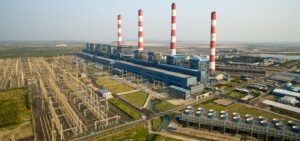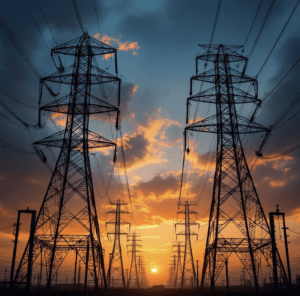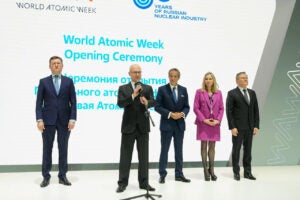Both the 1979 Three Mile Island accident and the Chernobyl catastrophe prompted worldwide retreats away from nuclear electric generating technologies. Despite brave rhetoric from nuclear supporters around the world—including Electricité de France, the U.S. Nuclear Energy Institute, and U.S. Energy Secretary Steven Chu—the disaster in Japan seems to be behind another retreat away from atomic power. The verdict of the Financial Times (registration required) is: "Growth will be slowed, but not stopped."
Soon after the Fukushima events began unfolding in the spring, Germany, always ambivalent about nuclear power, announced it would back down from plans to extend the life of its nuclear plants. Then, the conservative government of Angela Merkel unveiled a plan to phase out nuclear energy in the country within a decade. Recently, Bloomberg Businessweek reported that Germany’s industrial and business leaders are supporting the phase-out. However, the Federation of German Industries advised the government to conduct the phase-out carefully in order to avoid blackouts and disruptions to the country’s electrical supply. According to the World Nuclear Association (WNA), Germany’s 17 operating nuclear reactors supply 25% of the country’s electricity. The German move raises doubts about that country’s ability to meet its European Union targets for carbon dioxide gas reductions.
In Italy in mid-June, voters in a referendum overwhelmingly rejected the plans of the Silvio Berlusconi government to resurrect a moribund nuclear power program. In 1987, following Chernobyl, Italian voters approved a referendum to shut down the country’s nuclear plants; the final unit closed in 1990. The Berlusconi administration had announced plans to resume a nuclear program, including construction of new plants based on French technology, to begin in 2015. The June referendum saw 90% of voters reject that plan. Berlusconi said after the vote, "We shall have to say goodbye to nuclear." Italy once had four operating nuclear units and is currently the only G8 county with no nuclear generation, according to the WNA.
Switzerland in late May also announced it would turn away from the atom, according to a Bloomberg report. The Swiss get 39% of their electricity from five operating reactors. In reaction to Fukushima, the government quickly cancelled plans for two new nuclear units, following up with a decision to phase out the existing plants as their 50-year licenses expire. The first to go will be the Beznau pressurized water reactor near the German border, scheduled to go out of service in 2019. The presence of nuclear plants in Switzerland has enabled the country to sell its cheap excess hydropower into the European market.
India, planning to power its rapid economic growth with nuclear energy, has also announced a slowdown, according to a Dow Jones news service report. Following the Japanese events, the Indian environment ministry deferred approval of four nuclear units to be constructed in the state of Tamil Nadu. India gets about 2.5% of its electricity from its largely indigenous nuclear power program. Because it has never signed the Nuclear Non-Proliferation Treaty and has developed its own nuclear weapons program, until recently India was frozen out of international nuclear commerce, a circumstance that changed in 2008 with ratification of a nuclear treaty with the United States. India also has a large and vocal anti-nuclear community. The wire service report noted, "The country’s civilian nuclear program has come under fresh scrutiny after the crisis in Japan reignited debate about safety."
Even China, for many years the source of optimism for nuclear power developers, is having some second thoughts in the aftermath of Fukushima. Mainland China has 14 reactors in operation, according to the WNA, and as many as 25 additional units under construction. Today, nuclear contributes less than 2% of China’s electric supply. Nuclear Energy Insider, an online news service based in Britain, reports that China responded to Fukushima by ordering "comprehensive safety inspections" of its plants and has stopped approving new construction plans. The news service wrote that "while not admitting public pressure, certainly some planned plants will not now go ahead. A controversial reactor planned for Nanchong in Sichuan, a city of seven million people in an earthquake-prone area, is now "on hold" after renewed safety checks (officially) and a sudden new found outpouring of anti-reactor commentaries and posts on Sichuan’s internet (unofficially)."
Fukushima’s shocks are also being felt elsewhere in Asia, long viewed as the most favorable environment for new nuclear plant development. Nuclear Energy Insider reports that "Malaysia appears to have put its nuclear ambitions on hold." The country was seriously considering building its first nuclear plant. Thailand‘s energy ministry announced it is suspending plans for five commercial-scale units, to go alongside of an existing small research reactor. The news service reported, "An official statement came out … from the Energy Minister Wannarat Channukul, who said that Thailand has delayed its first nuclear power plant project by three years to 2023 on mounting public concerns after Japan’s nuclear crisis."
France, the leading nuclear power developer in the world, with some 80% of its electricity coming from the atom, is also taking notice of events in Japan. Platts reported, "French Prime Minister Francois Fillon has asked the state audit office to perform a detailed study on nuclear plant costs including those for decommissioning and waste storage." The analysis by the Cour des Comptes is to be completed by January 31, 2012, and "would supplement a separate report by the nuclear regulator ASN on the safety of plants following Japan’s Fukushima disaster, which is to be completed by the end of this year."
—Kennedy Maize is MANAGING POWER’s executive editor.








